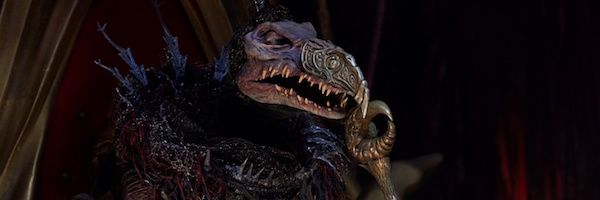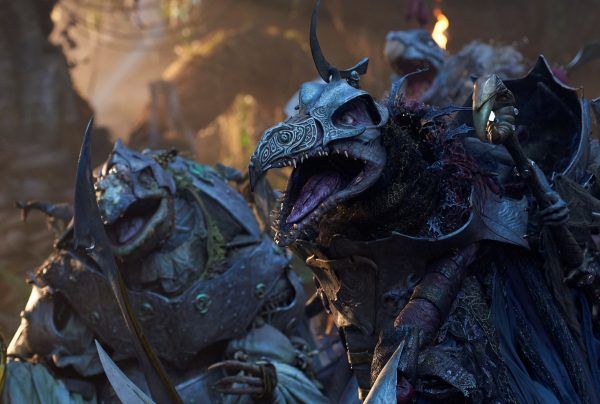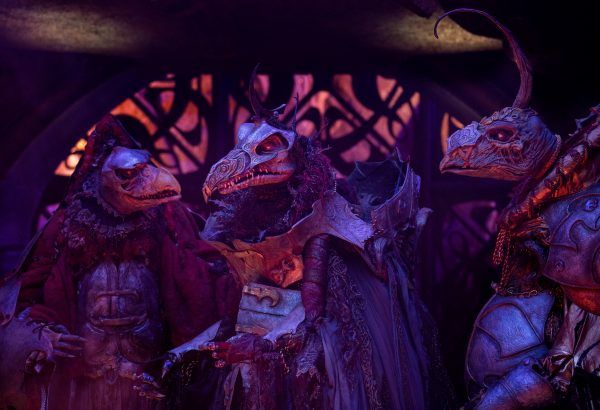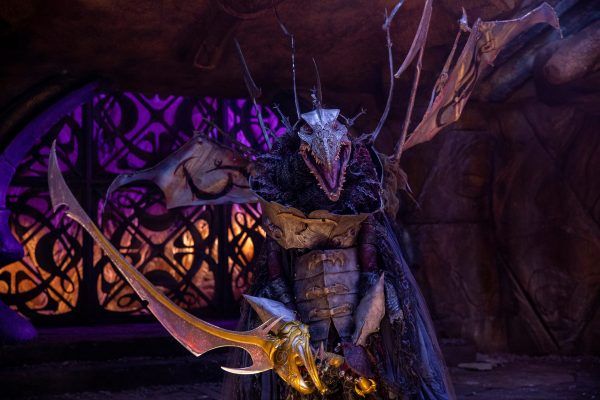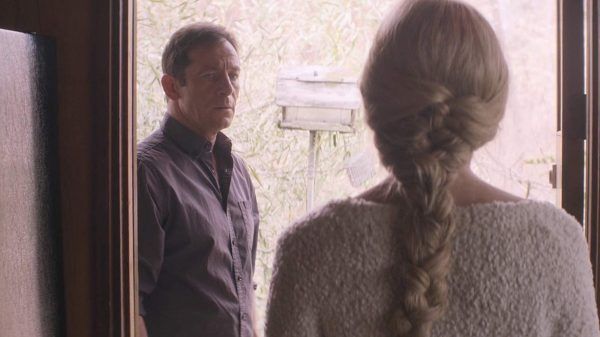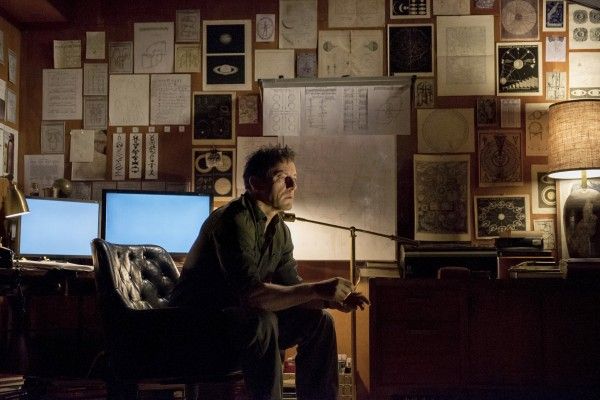The 10-episode Netflix original series The Dark Crystal: Age of Resistance, released 37 years after the original film, is a breathtaking, beautiful and terrifying return to the world of Thra. When three Gelfling – Rian (voiced by Taron Egerton), Brea (voiced by Anya Taylor-Joy) and Deet (voiced by Nathalie Emmanuel) – discover the horrific secret behind the power of the Skeksis, the fires of rebellion are lit and an epic battle for the planet begins.
During this 1-on-1 phone interview with Collider, British actor Jason Isaacs (who voices skekSo, The Emperor and ruler of Thra) talked about being a part of such an extraordinary project, finding his performance, how he viewed his character, what made this experience unlike anything he’s ever done, and whether he ever got to visit the set. He also talked about the disappointing cancellation of The OA, how much he’d been looking forward to continuing to tell what had been envisioned as a five-season story, and how his head was spinning with the possibility of getting to play a version of himself, as well as the voice recording experience for Scoob, the animated Scooby-Doo movie in which he’s voicing the villainous Dick Dastardly, and how his passion for storytelling has been rekindled with the projects he’s recently been doing.
Collider: What’s it like to not only get to be a part of a project that is just so extraordinary and spectacular, but to do so under the Henson name and to have Lisa Henson be a part of it all?
JASON ISAACS: Well, one of the challenges, as an actor, on every project and not just this one, is to try to forget everyone’s expectations, whether you’re on a mini-budget movie and you go, “Oh, my god, we’ve only got a half an hour to shoot the scene, before they come kick us out of the public library,” or you’re on a big budget movie, and you go, “Oh, they’ve invested $300 million dollars and people are going to lose their jobs or houses.” When I did Star Trek, there’s this massive community out there, waiting for you to fail, with their knives sharpen. Similarly with this, you have to completely forget the fact that it’s this extraordinarily brilliant, iconic film that has legions of fans, who’ve had 30 years to foment their passion and go, “What’s this story? How do I tell this story well?” But it was apparent to me, early on, just looking at the footage, when I first went in to do the first days, that the level of artistry on display was incredible. Before you can get into the story itself and how well the story is told, just the sheer skill and stunning imagination that’s gone into creating and expanding the world, and all of the creatures, the places that they live, and the houses they live in, and what the puppets themselves look like, is so jaw-dropping that immediately it just relaxes you. Your shoulders come down and you think, “Okay, we’re in safe hands.” And then, the story unfolds, and it’s everything.
It’s an epic quest that’s got romance, terror, thrills, politics, peril, triumph and disaster, and it’s completely resonant, politically and contemporarily, but without ever shoving that [in your face]. I thought, “Okay, these people really know what they’re doing, and they’ve done it properly. No one’s exploiting anything. They’re celebrating something.” And then, there’s [Louis Leterrier]. Louie’s an amazing man. How one person could take on all of this, with Lisa’s help, obviously, and amazing craftsmen, in every department, and hold all of this in his head, and shoot a gigantic, high-budget, fantasy, epic adventure series, but with the puppets, and make that authentic and real, I can’t even begin to describe to you the torture that he put himself through, to get all of the voices right. A lot of the actors were in England, and Louie was in Los Angeles, finishing this thing. I would go in to voice The Emperor and my sessions were always between 9:00 pm and 1:00 in the morning, which means Louie was there between 1:00 and 5:00 in the morning, in his house, in Los Angeles. Having worked a full day, and then going home and seeing his family, he then sat on the couch and dubbed with me, and a series of other actors, through the night and day, and then he went back to work. I don’t think he went to bed for two years. I don’t quite know what evil elixir he’s been taking to stay alive, but it’s something else. To be as exacting as he was, about making sure that every syllable sounded like it was being said and that it meant something, I can’t imagine how much he must’ve been praying for it to be over, so he could close his eyes for five minutes. It’s just a tribute to his ambition. So, I rode on everyone else’s wave, and Lisa’s desire to honor her dad’s legacy, and make this better, bigger, richer and more complex, and Louie’s desire to make it perfect. If you didn’t bring your top game, when the other people had designed and built this world to such an extraordinary level, it would feel like negligence. The whole thing felt like a fast-moving giant wave, and I just rode it.
Since this is a bit of an unusual project, where you’re not on these sets to do the work, but you’re instead recording your voice performance, how did you find that performance? Did you have a puppet to look at, or any drawings?
ISAACS: It was unlike any voice recording that any of us have ever done before. They’d shot the scenes already. Someone else had decided the body language for your character, where he or she interrupts and stands, screams, shouts, sits down, is cross, or whatever it is, and they’ve recorded the dialogue and the mouth flaps. So, you’re not doing what you normally do with animated projects, which is going in and dreaming and improvising, and doing a bunch of stuff, which they then animate to. The voice was already done. I was watching the scene, and I had the puppeteer’s voice and guide track in my ears, at the rhythm which I had to match it exactly because that’s where the mouth flaps were, and they were not using CGI to cheat. That meant the creativity, as it were, and having some input in actually building a character happened within very narrow parameters because it’s essentially all done for you. The challenge was not falling into that and going, “Okay, I’ve matched the flaps, and it sounds like it’s coming out of that creature, so that’s enough.” Luckily, I wouldn’t settle, and even if I would’ve, Louie didn’t settle for anything, ever. He would go, “Those are the puppeteers’ performances, vocally, but we’ve asked you to do it.” So, you had to try to find some way of building something interesting, exciting and emotional, whatever that was, while ticking all of these technical boxes. That’s not something any of us had ever done before.
This whole thing just sounds like such an incredible experience because it was such an unusual experience. Did you ever get to visit the set, or see your character puppet in person?
ISAACS: No, it was all shot, before we started voicing. I think it was all finished. The first day that I went in and met Louie, he was in London. He was always in Los Angeles, after that. The first time, I said to him, “Look, I’m thinking about what kind of voice would be right. I don’t want to do an impression of whoever did it last time. I’m looking at this huge alligator-like and dragon-like snout, but with a hole in it, because he’s got a fake nose on and those rows of extraordinarily jagged teeth, and I’m trying to figure out what kind of sound would come out of it. Can I hear some of the other voices, so that I can work out what kind of universe we’re living in?” He said, “No, you can’t.” And I said, “Well, I won’t tell anyone.” He said, “You can’t, because you’re the first person to do it.” And I said, “Oh, damn.” So, we just tried to come up with something that we thought belonged in that world. It’s an amazing world, and I laid down a little marker, which is what we stuck with. I don’t think there was a single day recording, where I didn’t lose my voice. It’s a very unusual discipline. The other thing that’s hard to do is that, normally, when you’re an actor doing ADR and replacing your own voice, which happens all the time, on every film and television series, because there will be some car horn going off, you’re trying to match what you did in production, since that was good enough on the day and you were emotionally present. But here, we weren’t trying to match what the puppeteers had done. God bless them, maybe they’re a thousand times better than me, but they’ve asked me to do it instead. So, whilst completely adhering to their rhythm, I had to make sure that it was my own, and that I wasn’t singing their tunes.
Your character is one of the Skeksis, who are the villains of the story, but they also have a purpose, in what they’re doing. How do you think he views himself?
ISAACS: Let me answer you by posing a question: Is a lion eating a wildebeest at a watering hole villainous? These creatures are surviving and dominating, and they want to continue to dominate and survive. I remember watching a documentary about steroid abuse in the Olympics, and they asked a couple of ex-Soviet Union guys, who were fading from catastrophic diseases and chronic conditions that they got as a consequence of taking drugs, whether they’d do it again? The two of them held up their medal and went,”Look what I got. Of course, I would.” The Emperor has only known dominance. He’s only known control, and what it’s like to rule. The Skeksis have ruled forever. That is the order of things, on this planet. He’s not going to be the one with his hand on the wheel, when the bus goes off the cliff.
You also recently had another much talked about and much written about project with The OA. Did you know anything at all about where Season 3 would have been headed? Did you know where that would have been going, if it hadn’t been cancelled?
ISAACS: Yeah, they mapped out all five seasons, when they pitched it, originally. They wrote the whole first season on spec, and it took two years to write it. I think that’s why the show had such a clearly unique voice. It was Zal [Batmanglij] and Brit [Marling], with nobody’s interference. You know that old saying, “A camel is a horse made by a committee.” It’s so much their voice. It resonated so much with their humanity, their authenticity, their beauty, and their desire for human connection. That’s why it’s touched so many people, so profoundly. That’s why there’s such a big movement now. There have been flash mobs outside of Netflix’s headquarters. The Save The OA people have taken a billboard in Times Square. I wouldn’t want their job. I don’t know what they base their decisions on. I respect them and I admire them for commissioning it, in the first place, and I’m so grateful that we got to make two seasons. But yeah, I knew exactly where the third season was going to go, and it’s utterly brilliantly. When they told me the end of Season 2, I went, “Wait, guys, are you actually sure? That sounds nuts to me. What can you possibly do afterwards?” So, they sat me down and told me, and 15 minutes later, my jaw was hanging open. I just couldn’t wait to get started making it. And now, it looks like we won’t be making it. I’m sad, not just for the fans, but for me, because I was at the front of the line. I’m such a huge fan of the show. I’m dying to see the rest of the seasons because I know they happened in their heads, and I so enjoyed and was moved by the first two.
Were you hoping to see redemption for your character, or were you hoping for a further descent with him?
ISAACS: I’ll tell you something, when invited in, I’m very collaborative. I have a lot of ideas, and I’ve had a lot of input on an awful lot of scripts, over the years, and with things coming up. With Zal and Brit, when they asked me, I said, “No,” and backed out because I didn’t want to sully them, frankly, with my voice and a bunch of my derivative and recycled ideas. What I hoped for, and what I thought should or shouldn’t happen, was stuff I kept to myself because they always had better ideas. What I was hoping for was them to play their story out. There’s nothing in there that was ever deliberately wacky or self-consciously surreal. The talking octopus is because they’d both read a book about the octopus as possibly being the most intelligent creatures on our planet. And the network of trees is because they had both read about trees being the original network of communication, sharing where nutrients were with each other, and such. Everything in there is something that I was careful not to burst the bubble of. Not that they believed it to be true, but they had created a world that I had no cynicism about. It’s an entirely un-cynical story, even though some of the characters are cynical. With almost everything that I’ve ever been in, and maybe everything that I’ve ever been in, no matter how well-executed and how well received it is, you can describe it to somebody and go, “It’s a bit like a cross between X and Y.” The OA stands unique. Even though there are only the two seasons, one of the great things about Netflix is that they’ll be around for people to watch, for a long time to come. Although Zal and Brit do hold the keys for solving and resolving the mystery in their heads, those two seasons, by themselves, are a towering achievement.
Had you thought about preparing to play yourself on the show?
ISAACS: I had. My head was spinning, with what the hell was going to happen, how I was going to do it, and what it was. And then, of course, it’s not myself. It’s Hap inside of some version of Jason Isaacs, in a universe that they were going to create, so there was all kinds of fantastic potential there for that. And it’s a world in which Jason Isaacs is married to Brit Marling, by the way, which many people thought was true. They just were so smart at playing with those expectations, and coming up with things that were both interesting and clever, but also moving and human. And they changed the goalposts, all the time. Season 2 was so different from Season 1, and Season 3 was going to be very different from Season 2, as well. I feel sorry for everyone, and mostly sorry for me, that we won’t get to watch it.
So then, do you have a sense that the cancellation is final, and that there are no other rumblings about it possibly going somewhere else?
ISAACS: Netflix cancelled it. They are not making any more of The OA. Are we all moved and inspired by the fan momentum, and all of the people online, and the people demonstrating? Yeah. Do I know whether that could or couldn’t have any effect on it? I don’t know. I don’t work at Netflix. They’ve been great to me, and they make amazing shows. They’re in a tough environment, with a billion people making a billion things, all around them. I don’t know if they could change their mind or not. In my fantasy world, I get to do more of The OA. I think it would be unprofessional of me to be marching outside of Netflix with a placard. They don’t have my job, and I don’t have their job.
You’re doing another project that’s from a personal favorite of mine, with the Scooby-Doo movie, Scoob. How much fun is it to get to play a mustache-twirling villain, like that character? What did you enjoy about being a part of that world?
ISAACS: It’s so different. It’s pure fantasy and entertainment. There’s a lot of improv going on, and the guys that made it are great fun. You just go in the studio, and you laugh, and you come up with stuff that you think is great, and then they go and animate it and try it out. Then, they go, “No, that didn’t work. Let’s do this instead.” There’s so much flexibility and time. And Dick Dastardly is the biggest ham in the history of the world. There are people out there who’d say that I’ve already done that, many times before, but I’ve taken it and turned it up to 11, for this.
You’ve been doing such an interesting variety of projects. At this point in your life and career, what is it that you look for in a project? What gets you excited about doing something?
ISAACS: I don’t know. I wish I knew because then I’d try to produce it. I’m trying to produce stuff, as well. I’ve been around so long that I don’t really like repeating myself. I don’t just do it for money, but I have to earn a living, like everybody else. Every now and again, and in the last couple of years, there have been a whole series of projects in a row, which is unusual because, normally, there’s one, every five or six, but the passion for storytelling has been rekindled and reawakened in me, by The OA, Hotel Mumbai, The Death of Stalin, Star Trek and The Dark Crystal. I meet people who have been affected by those projects, and not just enjoyed it. It’s one thing to entertain people, and that’s great. The higher aspiration that you always have to have is to entertain them, make them laugh, make them cry, and make them think, or whatever, but to stay with them beyond the credits. No matter how fantastical and extraordinary the story is, and in what far away universe it takes place, it somehow does what all stories have done, which is give you a template and frame of reference for when you’re facing challenges in your life. I look for things that are fun for me to do, because it’s a pleasure-seeking job and I just like pretending to be other people, and that I think will have some resonance and value, beyond taking up two hours of someone’s life, or 10 hours of someone’s life, and that puts something in the world that may help them, either a as a cautionary tale, or an inspirational tale, but do something. If you’re really, really lucky as an actor, those things comes along, once in a blue moon. I’ve had a few in a row, so maybe I’ve had a good run and I’ll have to go back being the man in the suit, finding the murderer, for awhile. But if I’m really lucky, I can keep the ball rolling awhile.
The Dark Crystal: Age of Resistance is available to stream at Netflix.

